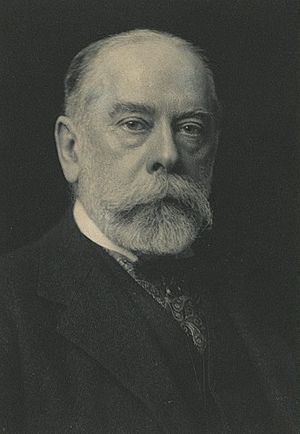Edwin Lawrence Godkin facts for kids
Quick facts for kids
Edwin Lawrence Godkin
|
|
|---|---|
 |
|
| Born | 2 October 1831 County Wicklow, Ireland |
| Died | 21 May 1902 (aged 70) Devon, England |
| Occupation | Journalist, editor |
| Signature | |
Edwin Lawrence Godkin (born October 2, 1831 – died May 21, 1902) was an important journalist and newspaper editor. He was born in Ireland but became an American citizen. He started a famous magazine called The Nation. He also led the New York Evening Post newspaper for many years.
Contents
Early Life and Education
Edwin Godkin was born in a small village called Moyne in County Wicklow, Ireland. His father, James Godkin, was a minister and also a journalist.
Edwin studied law at Queen's College, Belfast. While there, he was the first president of the school's Literary and Scientific Society. This shows he was interested in learning and discussing ideas from a young age.
A Career in Journalism
After college, Godkin moved to London in 1851 to continue studying law. But his passion was journalism. He became a war reporter for the London Daily News. He covered the Crimean War from places like Turkey and Russia. He even saw the Siege of Sevastopol.
In 1856, Godkin moved to the United States. He wrote about his travels through the southern states. He studied law in New York City and became a lawyer in 1859. However, he kept writing for newspapers like the Daily News and The New York Times.
Founding The Nation
In 1865, a group of people who wanted to end slavery asked Godkin for help. They wanted to start a new weekly magazine about politics. Godkin agreed and became the first editor of The Nation. This magazine started publishing in New York City in 1865.
The Nation quickly became known for its strong opinions. Godkin was the editor until the end of 1899. In 1881, he sold The Nation to the New York Evening Post. He then became a top editor at the Post from 1883 to 1899.
Godkin's Views and Influence
Under Godkin's leadership, The Nation and the New York Evening Post supported several key ideas:
- Free Trade: This means allowing goods to be bought and sold between countries without high taxes.
- Anti-Imperialism: This means being against one country taking control of other countries or territories.
- Civil Service Reform: This aimed to make government jobs based on skill, not on who you knew.
- Gold Standard: This was a system where the value of money was directly linked to gold.
Godkin was also very interested in Irish politics. He supported Irish Home Rule. This idea meant that Ireland should have more control over its own government.
He was a strong voice against political corruption. He often criticized groups like Tammany Hall in New York, which was known for its political machine. His newspapers were very independent. For example, the Post did not always support the Republican Party. It even disagreed with President Grover Cleveland on some issues.
Godkin also spoke out against the war with Spain and against imperialism. He believed in a limited government and free markets.
Later Life and Legacy
Edwin Godkin retired from his editing jobs on December 30, 1899. His health began to decline after a serious stroke. He passed away in Devon, England, on May 21, 1902. He was buried in Haselbech, England.
Godkin had a big impact on journalism. He made the Post and The Nation known for their independent and thoughtful reporting. While his magazines had a smaller number of readers, these readers were often very influential thinkers.
After Godkin's death, a famous philosopher named William James said that Godkin was "certainly the towering influence in all thought concerning public affairs." This shows how much respect Godkin earned for his ideas and his work.
Works
- Government, "American Science Series," 1871.
Selected Articles
- "Anglo-French Alliance and Orsini," The Knickerbocker, Vol. III, No. 1. July 1858.
- "French Invasion of England," The Knickerbocker, November 1859.
- "The Political Outlook," The Century Magazine, February 1880.
- "The Danger of an Office-Holding Aristocracy," The Century Magazine, June 1882.
- "The Absurdity of War," The Century Magazine, January 1897.
 | Tommie Smith |
 | Simone Manuel |
 | Shani Davis |
 | Simone Biles |
 | Alice Coachman |

